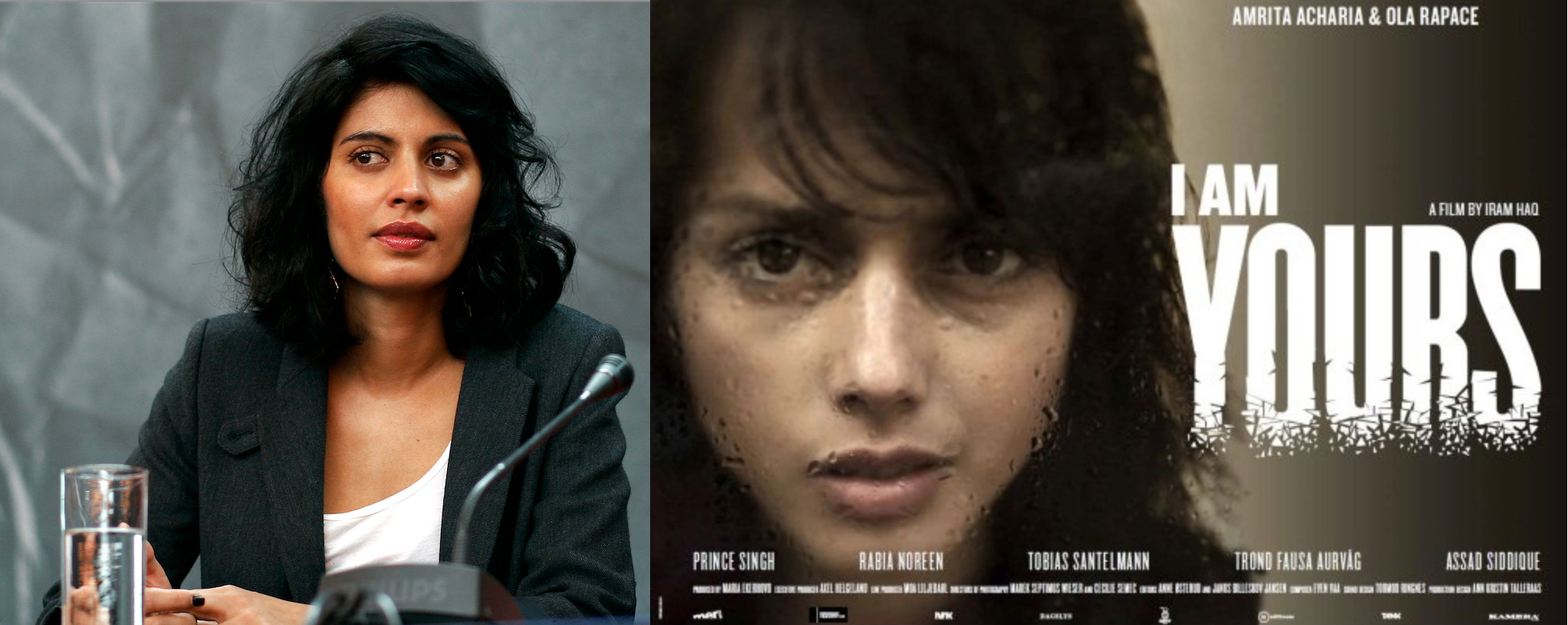By Daria Landal
Six years ago, an aspiring female director Iram Haq took her script to the Norwegian Film Institute, shaking from embarrassment to show the members what felt very much like her own dirty laundry. Coming from a Norwegian Pakistani family, she was brought up to be shameful, to be careful about what the neighbours would think.
Now, when her feature film debut I Am Yours is being screened internationally as a Norwegian entry film to the 2014 Oscar race, these neighbours might well have exploded from indignation.
I Am Yours is a semi-biographical story of a young Norwegian Pakistani woman, Mina, who dares to be a single mother and, to her family’s utter disgust, an actress. As she tries to balance her life and relationships, the pressure takes its toll.
“The story is a mix [between fact and fiction],” says Iram. “It was inspired by my own life experience, and some notes for the script were actually from my own diary.”
Iram Haq, an actress and screenwriter, made her directorial debut at Sundance in 2009 with short film Little Miss Eyeflap, a story of a Norwegian Pakistani girl who wants to escape a force marriage her family imposes on her. I Am Yours was to be Iram’s second short film, but the production kept expanding.
“I started working on it as a short movie in 2009, and then I got additional financing in 2010, and in 2011 I got some more money so we could shot more scenes in the winter 2011,” says Iram. “It was an endless re-edit and re-writing process. But in the end, it was a very organic way of making a movie.”
Perhaps having enough time on one’s hands to tell a personal story was the best option for Haq. Iram, who admits being happy with the way the film was shot, wanted to make her film as personal and relatable as possible.
“I wanted to tell a story about things we’re ashamed of. I challenged myself to tell a «naked» story, which is not about comedy or humour or a glamorous movie with nice music,” says Iram. “I wanted to make a movie that would make you feel you’d feel the same if you’d gone through that. I wanted to crack up a facade, throw out all the dirty laundry. I wanted the audience to feel Mina’s pain.”
The film very much reflected her own troubled experiences years ago: Iram’s life after leaving her family and loosing her roots, making her own (occasionally wrong) decisions and not always being able to “be a brilliant mom” to her son.
“I had an inkling that the story quite personal [to Iram],” says Amrita Acharia, a Nepali actress who took the role of Mina in the movie. “It was very lovely to get a script that wasn’t about a typical leading lady. There was no boundaries to the script at all.”
Acharia, known to the general audience as Irri from HBO’s Game of Thrones, was far from the first choice for the role. Iram Haq auditioned twenty-five actresses for the part, searching both in Norway and abroad, but none of them felt right for the part. At some point, Iram considered starring in the movie herself. “At a very early stage, when I first wrote the script, I thought maybe I could act in this, but then it would be too much – I’d be writing directing and acting,” says Iram. “And then I met Amrita.”
The role of Mina became Amrita’s first lead role in a feature film, which was already challenging enough. But the character herself was riddling for her, too. “[In 2009], I was at a very different stage then, I was in the beginning of my career,” says Acharia. “And it’s very challenging to play a woman that is completely on the edge. Many times I didn’t understand why she was acting like that. Although it was a long filming process, we got to develop Mina so much, she’s got so many layers to her.”
Haq agrees: “Mina is vulnerable, and sometimes she’s doing stupid stuff. But Mina is ruthless, and she tries her very best to deal with her life.”
The second most challenging character in the movie proved to be Felix, Mina’s 6 year-old son, played by an Indian actor Prince Singh. “We had this little boy who was six at the beginning [of the filming], then he turned seven and didn’t want to play [his role] anymore,” recalls Iram. “Still, he’s one of the least annoying child actors.”
Iram took a very flexible, creative approach with cinematography and a very strict one with the editing process. “A lot of stuff was edited out,” admits Haq. “But I’m glad. I didn’t want to build up a distance from the audiences. The scenes [that ended up on the cutting floor] were beautifully shot, but ultimately they would bring a gap [in the story].”
Another thing that did not make the cut was a female character that was supposed to be Mina’s best friend in the movie. “Initially, I wrote in an early script that she had a best friend, but I thought it was unnecessary,” says Haq. “I wanted to make Mina as lonely as possible. I took it away so we could concentrate on her loneliness.”
A story about a Norwegian Pakistani girl who dares to go her own way was bound to spark tensions in a Norwegian Pakistani community. “No Pakistani in Norway wanted to play in the film, this was too controversial for them. That’s why I had to look outside of the country,” says Haq. “The gay Pakistani community in Norway loved the movie. The second generation [of Pakistani immigration], outgoing and free-minded people, they liked it. But a lot of Pakistani aunties in Norway took the opportunity to say: “Look at her! That’s what gonna happen if you leave the family!”
“Many Norwegian Pakistani girls thought: “Why is she trying to portray Scandinavian guys like this?” and then, “We don’t masturbate. No Pakistani girl ever masturbates!”. Of course, there’s always criticism. But I can’t tell everyone’s story, I’m telling mine.”
Amrita Acharia felt much the same way. “It wasn’t just about writing a script or making the movie, it was about telling a story which many other girls went through.”
“We told a story that Iram wanted to tell, and that was the most important thing.”








Many thanks to Daria Landal for the great review on a “very different”, freeing story of Iram Haq!
Daria Landal, thank you for this deep review! I believe such films make us redefine our own lives!
Thank you, Daria Landal for such a thorough review!
Daria Landal, thank you for the great review!